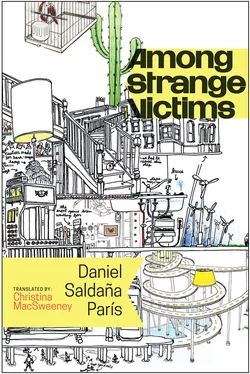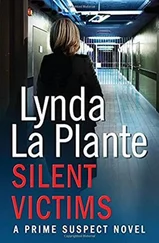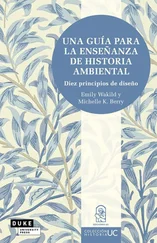 4
4 
Tuesday, the inertia continues. On opening my eyes, in contradiction to what I’d predicted, it is not the tea bag I first see but the window overlooking the vacant lot. With my morning coffee steaming before me, while I wait for the computer to start up so I can take a quick glance at the day’s headlines on the internet, I look out the window to see how the lot is doing this morning: if there are more or fewer garbage bags — every so often, without explanation, the bags disappear — if it rained during the night and the ground is muddy, if some vagrant has gotten in to find shelter and safety under the branches. Checking out the state of the lot every morning is a basic activity. It makes me think of people who live near a river, who, as soon as they wake, hurry to see what state the waters are in: “It’s low today,” they announce, or “It’ll flood today.”
The garbage bags haven’t gone. There are no down-and-outs. But I notice a movement among the bushes in the lot. “That’ll be a cat,” I think. There have been cats on other occasions. Lost or exiled kittens, or kittens booted out, almost as soon as they’ve left the bloody womb, by happy but practical families who know they can’t live with animals everywhere. But it isn’t a cat: a dirty hen appears between the weeds, pecking at the ground in search of food. How could that hen have gotten there? Perhaps someone has surreptitiously installed himself in the lot and let loose his farm animals, for personal consumption, as they say. But I can’t see anyone, nor any other farm animals, just the hen, which occasionally disappears behind some car tire or scrub plant and reappears on the other side, making that intermittent noise I never know the name for because I’ve never lived a particularly rural life, except for that other vacant lot, the childhood one we used to call the Thicket, which never had any fauna besides the scorpions and spiders my father used to warn me about when I went out to play with the other children.
No, I’ve always been eminently urban. Before this apartment, I lived very close to the Zócalo, in one of those alleys where the street vendors used to crowd together, shouting, until the city authorities gave the zone a facelift and put them all in an enormous warehouse so they had to suffer the penance of their own cries without deafening the tourists, mutually punishing each other with their earsplitting reverberations.
And before I lived downtown, I was in Coapa, in one of those residential estates with identical houses that were once upper middle class and are now inevitably occupied by hordes of teenagers accustomed to the cultural aridity of the periphery; teenagers who gather in the green spaces to smoke pot and show off their skateboarding tricks, and whose career ambitions are usually to work in a skateboard store or have someone pay them to set fire to vacant lots.
I was one of those innocuous teenagers, I admit it, and not as long ago as I’m ready to accept. I was, let’s say, an aging adolescent in Coapa, when I lived with my mother — in the damp house, near the one where a woman hanged herself from a beam — and I pretended to go to the university every day, while in fact I’d already dropped out and was convinced it wasn’t necessary to study anything (as I am now, although maybe I was more belligerently convinced then). I used to go to the green spaces as well, and though I didn’t skateboard, I did smoke pot and bought acid tabs that I later sold at a profit outside a state high school to make a little money for books or pirate video games, bought in nearby Pericoapa — the video games — or Avenida Miguel Ángel — the books. (I have a particularly fond memory of a book written by a French executioner from who knows what remote century and a video game in which, for the fun of it, you could kick your opponent when he was down.) I never had a dog or a cat, much less a hen, although once, during those horrible teenage years, bored and high on drugs, I bought a rabbit at the traffic lights and then treated it so badly that it attacked me viciously, making the most implausible gash on my arm, from which I still have a scar, and in moments of weariness, it seems to take the shape of a rabbit — as happens, they say, with the full moon, though I’ve never been able to verify that.
After the rabbit, I don’t think I ever again lived with animals. At best I must have seen, out the car window on the highway to Acapulco, the agglomerations of sheep and the distant, iconic cows. And now — right under my window, in a central zone of a city for which, like God, the apt metaphor is the circle whose center is everywhere and whose circumference is nowhere — well, now I can see a dirty hen pecking the ground of the vacant lot. Do you say “crow?” No, that’s cocks. The thing is that hens have their own sound, so inalienably their own, and I can’t go on thinking about what you call that intermittent chirping, because it’s Inertia Tuesday and I have to go to the museum to correct the letters the secretary writes incorrectly and meet — in a corridor; I don’t have my own office — the unwelcome photographers who are proposing an exhibition on heroin users who live in the sewers, or women who live in the upscale suburb of Polanco and screw their chauffeurs when their husbands go to New York on business.
I’ve got it: it’s called clucking. The sound the hen makes is called clucking.
 5
5 
My childhood, excepting the above-mentioned absence of pets, was pretty normal, if anyone’s childhood can ever be normal. In Cuernavaca, in my father’s house, I amused myself torturing beetles, tying their legs to watch how they flew in circles, burning them with a magnifying glass, or asphyxiating them with the fuel from a lighter. I also used to make waterways out of the PVC tubing I found in the Thicket, that other vacant lot that may have inspired me in the search for the one that now lies below my window. I would assemble long sequences of tubes, the joints perfectly sealed with Play-Doh, through which I would run the water and then throw in my toys. This ludic activity suggested the fruitful career as a civil engineer I had the good judgment to avoid, to the disappointment of some of my relations and the great disgrace of my savings account.
At school — it was a Montessori school — I liked lying down at the back of the classroom and falling asleep in the middle of the lesson, something that was perfectly allowable and even encouraged by certain ultramodern teachers. These same teachers, who had probably once, or more than once, gotten a divorce, and fancied themselves as artists — one painted in oils; still lifes, I seem to remember — had legs covered in hair, and staring at their calves was like observing the wild, impenetrable depths of the Thicket.
College meant a return to the capital, to my mom’s house. Dad had fallen in love with a woman from Chiapas and had settled in San Cristóbal de las Casas, taking with him his modest workshop for the manufacture of “artistic aromatic” candles and its three or four employees. The designs for the candles included symbols like the yin-yang or Viking runes, and in a San Cristóbal, which — in the final years of the last century — was making its debut as the destination of choice for revolutionary tourism, those New Age details were well received by the floating population of Italians. My dad’s artistic candle business flourished in this context, as did many medium-sized and small businesses that took advantage of a niche in the market produced by the neo-Zapatista movement (the woolen Subcomandante Marcos figures made by the indigenous people, the baggy T-shirts with slogans and motifs related to the struggle, the traditional medicine clinics, et cetera). With the passage of time, my dad got fed up with the candles and delegated the management of sales and manufacture to his wife, returning to academia, if only peripherally, to give a couple of classes in a forgotten political research institute in the center of San Cristóbal.
Читать дальше

 4
4 







